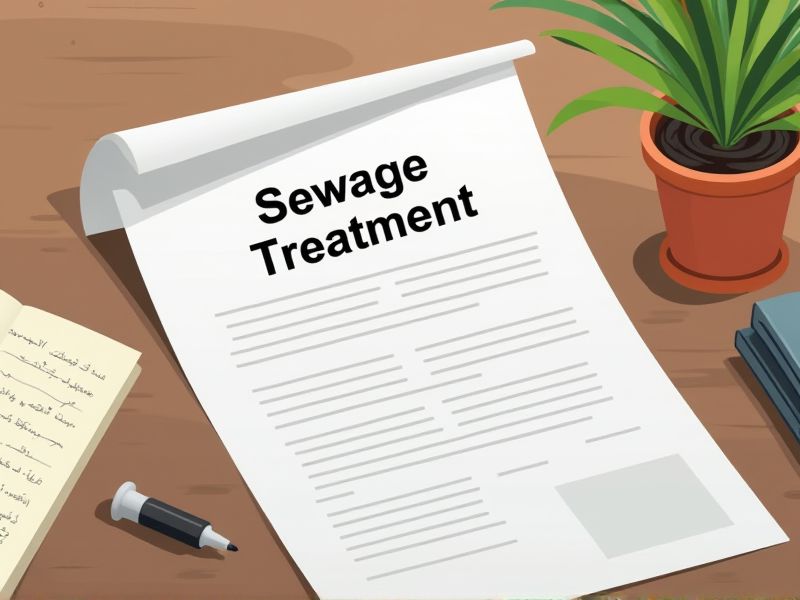
Sewage treatment plant operators are crucial for ensuring public health and environmental safety, as they control complex systems for wastewater management. Certification is essential because it validates an operator's knowledge and skills, ensuring they can handle the technical and regulatory demands of the role. It serves as a standard of competence and commitment to maintaining high operational standards, minimizing pollution risks. Important certifications can include the Class I or II wastewater operator certification among others.
State-licensed Sewage Treatment Plant Operator Certification
State-licensed Sewage Treatment Plant Operator Certification ensures operators understand essential safety protocols, reducing environmental hazards. Certification verifies an operator's proficiency in maintaining plant equipment, preventing costly system failures. State oversight aligns plant operations with regulatory standards, minimizing potential legal issues. Licensing promotes a workforce competent in adapting to evolving sewage treatment technologies.
Certified Wastewater Treatment Plant Operator (CWTO)
The presence of a Certified Wastewater Treatment Plant Operator ensures compliance with environmental regulations, reducing the risk of legal penalties for the sewage treatment facility. Competent management by a CWTO leads to more efficient processes, cutting operational costs through optimized resource utilization. Proper oversight by a certified operator mitigates the potential for system failures, preventing environmental contamination. An experienced CWTO brings expertise in emergency response, enhancing the plant's ability to handle unexpected incidents safely.
Hazardous Waste Operations and Emergency Response (HAZWOPER) Certification
HAZWOPER certification is necessary for sewage treatment plant operators since they frequently encounter toxic and hazardous substances. Handling these materials without proper training increases the risk of health hazards and environmental contamination. Compliance with HAZWOPER minimizes workplace accidents by ensuring operators are equipped to respond to emergencies effectively. It aligns with regulatory requirements set by OSHA, safeguarding both operators and public safety.
OSHA 10-Hour Construction Safety Certification
Obtaining the OSHA 10-Hour Construction Safety Certification equips sewage treatment plant operators with essential knowledge to identify potential hazards in their work environment. The certification helps reduce the risk of accidents by informing operators about safe practices and regulatory compliance in construction and maintenance tasks. With this certification, operators can contribute to a safer workplace, decreasing health risks associated with handling hazardous materials and confined spaces. Employers benefit from a workforce that's better prepared to maintain safety standards, which can lead to fewer workplace incidents and related costs.
Confined Space Entry Certification
Sewage treatment plants often involve confined spaces that present significant risks, such as toxic gas exposure and oxygen deficiency, making confined space entry certification crucial to mitigate these hazards. Certification ensures operators have the necessary training to recognize and control potential dangers, reducing the likelihood of accidents. Regulatory compliance also mandates certification to protect workers' safety and avoid legal penalties. Certification validates an operator's competence, instilling confidence among employees and employers in the operator's ability to handle confined space emergencies effectively.
First Aid and CPR Certification
Sewage treatment plant operators often work in environments with exposure to hazardous chemicals and gases that can pose immediate health risks, necessitating immediate medical response skills. Accidents such as slips, falls, or equipment malfunctions can occur in these industrial settings, requiring operators to perform first aid to stabilize employees until professional medical help arrives. The confined spaces and potential for oxygen deficiency within treatment facilities can lead to situations of respiratory distress, making CPR certification vital for emergency life-saving intervention. Having first aid and CPR certification enhances overall workplace safety and can significantly reduce the severity of incidents, promoting a culture of preparedness and responsibility among operators.
Lockout/Tagout (LOTO) Certification
Lockout/Tagout (LOTO) Certification is necessary for a Sewage Treatment Plant Operator to ensure the safe maintenance and repair of equipment, preventing unexpected energy releases which can cause serious injuries. Equipment at sewage plants often involves complex machinery with multiple energy sources that require thorough deactivation before servicing. A certified operator is equipped to manage these potential hazards by accurately implementing LOTO procedures, thereby reducing the risk of accidents. Certification provides the necessary skills and knowledge to comply with OSHA regulations, ensuring both operator safety and regulatory adherence.
Water Pollution Control Operator Certification
Water pollution control operator certification ensures that sewage treatment plant operators possess the necessary skills and knowledge to maintain public health and environmental standards. The certification process verifies that operators understand and can effectively utilize the latest technologies and techniques in wastewater treatment. Certified operators are equipped to manage complex systems and respond appropriately to emergencies, minimizing risks of contamination. Regulatory agencies require certification to ensure consistent compliance with environmental laws and regulations, safeguarding water sources.
EPA NPDES Certification
EPA NPDES certification ensures operators understand and comply with federal regulations designed to protect water quality. It equips operators with the necessary skills to effectively manage pollutants and reduce the risk of water contamination. Certification acts as a standard of competence, promoting operational safety and efficiency in sewage treatment processes. By obtaining this certification, operators contribute to maintaining public health and environmental sustainability.
Industrial Environmental Safety Certification
Industrial Environmental Safety Certification ensures sewage treatment plant operators adhere to regulations, reducing the risk of environmental contamination. Proper certification equips operators with knowledge on handling hazardous materials, enhancing workplace safety. Compliance with safety standards minimizes the incidence of workplace accidents and associated costs. Certification bolsters public trust by demonstrating a commitment to environmental responsibility.
Summary
By obtaining certifications, you can significantly enhance your expertise as a Sewage Treatment Plant Operator, leading to improved precision and efficiency in plant operations. Certified operators often see increased job opportunities due to their validated skill set and knowledge. Employers typically view certified personnel as more reliable, often resulting in career advancement and salary increases. Moreover, certified operators contribute to better compliance with environmental regulations, minimizing potential legal and environmental risks for the organization.
